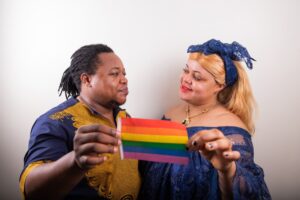Africa is a diverse continent with many cultures, norms, languages, and belief systems. Africa is also a continent where LGBTQIA+ (Lesbian, Gay, Bisexual, Transgender, Queer, Intersex, Asexual, and other nonbinary identities) persons experience exceptional human rights violations. Consensual same-sex sexual acts are criminalised in 31 countries, with the death penalty indicated in Mauritania, Nigeria, and Uganda. Incarceration ranges from one-year imprisonment in Liberia to life imprisonment in Sierra Leone, Sudan, Tanzania, Uganda, Zambia, and The Gambia.
Queerness is constantly portrayed as a Western import. This misconception fuels anti-gender sentiments, coupled with cultural and religious biases, denies LGBTQIA+ individuals their right to be themselves and has resulted in systemic and social forms of discrimination and violence against queer persons. Although some progress has been made globally in recent years towards recognising and proclaiming these rights, the struggle for LGBTQIA+ rights in Africa remains an uphill battle with no end in sight.
Historical context
The acceptance or non-acceptance of sexual and gender diversities in pre-colonial African societies varies. In pre-colonial Africa, queerness was exhibited in various ways, including, but not limited to, identities such as ‘mudoko dako‘ and ‘goor jiggen’, effeminate men in Lango, northern Uganda and Senegal, respectively, who were regarded as women and could marry men in Northern Uganda; ‘inkotshane‘ which was a form of male-male sexual relations in Basotho, southern Africa, and ‘motsoalle‘, which referred to intimate relationships between women in Lesotho.
Colonialism significantly reshaped African societies and imposed Western ideas about sexuality and gender.
Colonial powers imposed their own cultural and religious values. They introduced anti-sodomy laws and moral codes that criminalized same-sex relationships and non-binary gender expressions, which has contributed to the stigmatisation of LGBTQIA+ individuals in the present day.
The British Empire, for example, introduced anti-sodomy laws in many African colonies. These laws criminalised homosexual acts and reflected Victorian-era British values. Other European colonial powers, such as the French and Portuguese, also influenced their respective colonies’ legal and social landscape. These laws and norms continue to exist in some African countries to date.

Cheerful queer persons working. Photo via Shutterstock.
Decriminalisation movements
In recent years, Africa has experienced a growing movement to decriminalise queer identities and expressions across the region. This movement has faced setbacks and successes, but it represents a crucial step towards achieving LGBTQIA+ rights and freedoms across the continent.
South Africa is often regarded as a leader in LGBTQIA+ rights in Africa. In 1996, it implemented a new Constitution that included a bill of rights explicitly listing sexual orientation as a protected class. South Africa became the first country in the world to protect individuals from discrimination based on sexual orientation constitutionally. Same-sex marriage has been legal since 2006.
Mozambique revised its penal code in 2014, decriminalising homosexuality. This change was seen as a positive step, albeit limited in its immediate impact due to entrenched social stigma. Seychelles followed suit, where same-sex relationships were decriminalised in 2016. This change in the law was a significant milestone for LGBTQIA+ rights in the country. In January 2019, Angola decriminalised homosexuality by revising its criminal code. This move made Angola one of the first African countries to prohibit discrimination against people based on their sexual orientation. In June 2019, Botswana overturned a colonial-era law criminalising homosexuality, marking a significant turning point in the fight for LGBTQIA+ rights in Africa and inspiring hope in other nations.
Despite these promising developments, many African countries still maintain existing legislation and pass new laws to criminalise homosexuality, often justified on the grounds of tradition, culture, and religion. These laws facilitate the arrest, intimidation, and persecution of LGBTQIA+ people. LGBTQIA+ people also navigate the social stigma regarding their identities, which often results in exclusion and discrimination in several spheres of life, including work, school, and healthcare.
Religious and cultural objections are frequently peddled against LGBTQIA+ rights, which fuel hate crimes and other forms of harassment without consequence.
Organising for LGBTQIA+ rights
As LGBTQIA+ organisations continue advocating for rights and inclusion, they face a myriad of challenges that often hinder their progress. They primarily lack technical support, leading to a shortage of human resources, tools, services, and safety plans for staff, which impacts the efficiency of their operations and advocacy efforts. The limited ability to recruit and retain qualified staff further poses significant obstacles to sustained advocacy initiatives.
Organisational limitations also hinder resource mobilisation outside of project calls, restricting LGBTQIA+ organisations’ ability to access necessary funding and support. Insufficient recognition of the contributions of independent activists to the movement’s growth further hinders sustainability. Additionally, LGBTQIA+ activism faces financial challenges with limited access to information on funding opportunities, compounded by language barriers, as most calls are in English. The complex and tedious application processes exacerbate this issue, leading to uneven and competitive funding. Overreliance on one-off foreign grants also threatens financial stability and sustainability, as does the lack of core or multi-year funding, which is crucial for maintaining activities and skilled human resources.
Despite these challenges, LGBTQIA+ organizations continue to persevere, leveraging their resilience and determination to overcome obstacles. Collaborative efforts, strategic partnerships, and advocacy initiatives are crucial to fostering a more inclusive and supportive environment for LGBTQIA+ activism in Africa.

Glimmers of African queer liberation
LGBTQIA+ activists around Africa have accomplished great things despite these obstacles. There’s been a rise in thriving LGBTQIA+ groups working on community-building, advocacy, and assistance. Some of these groups are strongholds and change-inducing agents, putting forth an endless effort to combat prejudice and advance equality.
In Kenya, galck+ stands as a beacon of hope, advocating for rights and challenging discriminatory policies. Galck+ has been influential in forming working relationships and alliances with government institutions and civil society organisations, which inspire a society that appreciates diversity and recognises equality for everyone irrespective of their sexual orientation, gender, and expression.
South Africa’s Iranti works to advance LGBTQIA+ rights through research, media campaigning, critical engagement, mobilisation, and reframing perceptions through storytelling. It also raises awareness of LGBTQIA+ issues to reduce stigmatisation and discrimination and shares inspiring tales of resiliency.
The Initiative for Equal Rights – TIERs Nigeria uses research and documentaries to increase awareness and understanding. TIERs promotes equal rights for LGBTQIA+ people through community development, activism, and legal support.
CHEVS West Africa works to advance social justice outcomes and strengthen LGBTQI+ movements across the West African region by transforming power systems, reimagining movement resourcing, enhancing queer visibility and expression, and knowledge and insights generation and management.
The Interfaith Diversity Network of West Africa (IDNOWA) works in 10 West African countries, promoting respect for individuals regardless of faith or sexual orientation. Through dialogue with media, faith-based groups, and communities, IDNOWA bridges religious divides and changes attitudes towards LGBTQI individuals.
In the heart of Botswana, Legabibo embarked on a monumental journey to secure LGBTQI+ peoples’ rights to freedom of association. Through relentless advocacy and legal battles, Legabibo paved the way for a historic court decision that finally recognized the eligibility of LGBTQIA+ groups for registration in Botswana, a significant step forward in the fight for equality and acceptance.
In Uganda, SMUG International stood unwavering in the face of adversity, championing the rights of stigmatised and persecuted minorities. Despite facing threats and navigating legal hurdles, SMUG International, a resilient umbrella coalition, fiercely advocated for LGBTQIA+ rights and played a pivotal role in opposing the notorious “Anti-LGBTQ Bill.”
In Namibia, the Equal Rights Movement has been at the forefront of advancing LGBTQIA+ rights despite facing social barriers. Leveraging community support, advocating for legal reforms, and spearheading awareness initiatives, Equality Namibia has made significant strides in promoting inclusion and equality for all.
Across the continent, Pan Africa ILGA emerged as a formidable force, uniting LGBTQIA+ activists in a common mission to advance rights and foster acceptance. Through collaborative efforts and strategic advocacy, this regional group engaged with legislators to push for legislative reforms to improve LGBTQIA+ rights throughout Africa.
Organizing against all odds, the tenacity and resilience of LGBTQIA+ activists in Africa should be recognised, underscoring the transformative impact of collective action and advocacy. From challenging discrimination to advocating for equal rights and creating supportive communities, these activists continue to inspire hope and drive progress toward a more inclusive and equitable Africa.
Feature photo by Alessandrobiascioli via canva.com
Elsie Prah is a dedicated activist, working to build a strong feminist movement and promote solidarity as a member of the human rights organisation at Interfaith Diversity Network of West Africa (IDNOWA). Elsie focuses on LGBTQ+ rights and strives to create a more visible, inclusive and equitable society for marginalised communities. Elsie is passionate about addressing climate change, tech, feminism, gender inequalities and fighting disability injustice.
This story is part of a series in collaboration with the Yemoja Feminista Fellowship by CHEVS, a queer feminist organisation dedicated to advancing social justice and strengthening LGBTQI+ movements across West Africa. The series features insightful analyses, and fervent calls to action from young feminists addressing issues across gender, culture, and human rights in West Africa. The stories offer personal viewpoints on the struggles and victories of feminist activism in the region and the critiques of systemic injustices. The authors prompt us to face uncomfortable realities, question entrenched norms, and imagine a future where all people are free to live authentically and thrive.
Amidst growing complexities, regressive attitudes and laws targeting LGBTQIA+ rights, attacks on sexual and reproductive health rights by anti-gender networks, and the enduring impact of colonial legacies and harmful cultural practices, storytelling remains a vital tool. It challenges stereotypes, centers marginalized and minoritized voices, advocates for healing justice and collective care. In stories we honor the legacy of African feminisms and the tireless work to dismantle intersecting oppressive systems and create a vision of the future grounded in equity, justice, and love. – Rosebell Kagumire, Editor, African Feminism.
